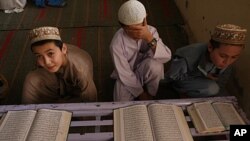A report by the U.S. government's commission on religious freedom says public schools and madrassas - private religious schools - in Pakistan are fueling discrimination by casting Hindus, Christians and other religious minorities in a negative light. The report also documents how schools in the mostly-Muslim country are not teaching religious tolerance.
The U.S. Commission on Religious Freedom is funded by the government but independent, and it has actively monitored the rise of violent religious extremism in South Asia. Its new report says textbooks in Pakistan's public schools and madrassas negatively portray Hindus, Christians and other religious minorities. The commission said such biases fuel acts of discrimination and possible violence.
It found that public school textbooks often have a strong Islamic slant, and that religious minorities either are omitted or referred to in a derogatory way.
The report said Hindus are depicted in especially negative terms, and that references to Christians were often inaccurate and offensive. Teachers interviewed for the study had negative views about Christians, Jews and Ahmadis, a sect of Islam.
The commission said teaching discrimination increases the likelihood that violent religious extremism in Pakistan will continue to grow.
Religious minority leaders in Pakistan welcomed the report. In an interview with VOA Radio Deewa, Haroon Deyal of the All Pakistan Hindu Rights Movement said Pakistani schools need to stop promoting religious intolerance.
“As a Pakistani Hindu, in my opinion, it is very necessary to take practical actions to remove this kind of education from the text[books] and include other religious education in the text to promote religious harmony in Pakistan,” said Deyal.
The education minister of Pakistan's Khyber Pakhtunkhwa province, Sardar Hussain Babak, also told VOA the curriculum must be changed.
“We are facing so many problems in this regard, like militancy and all of the extremism here in Khyber Pakhtunkhwa. So it is now, I can say, it is a dire need to change, to revise the syllabus and to revise the curriculum,” said Babak.
The International Center for Religion and Diplomacy, a U.S.-based group, conducted the study in coordination with an independent Pakistani think-tank, Sustainable Development Policy. The two organizations reviewed more than 100 textbooks in schools from Pakistan's four provinces. Students and teachers from public schools and madrassas also were interviewed.
US Panel: Pakistani Schools Teaching Religious Intolerance
